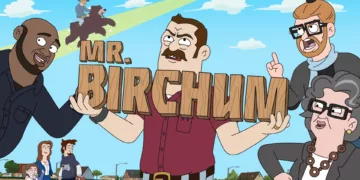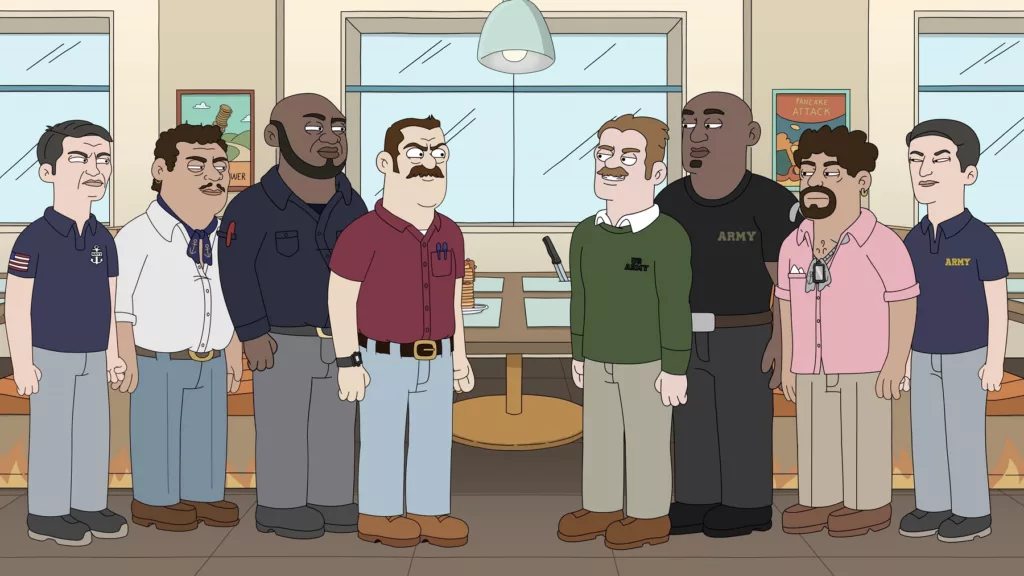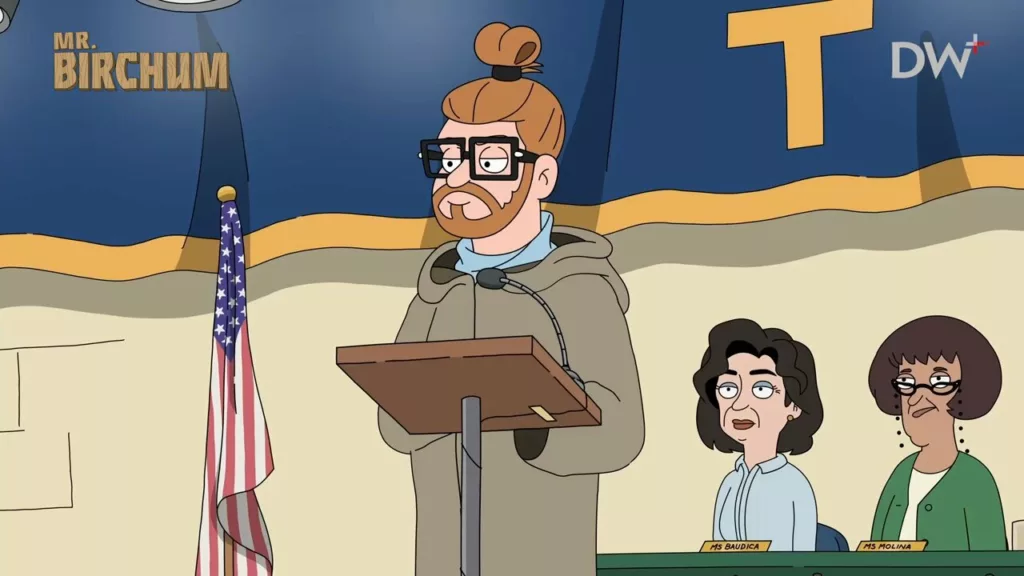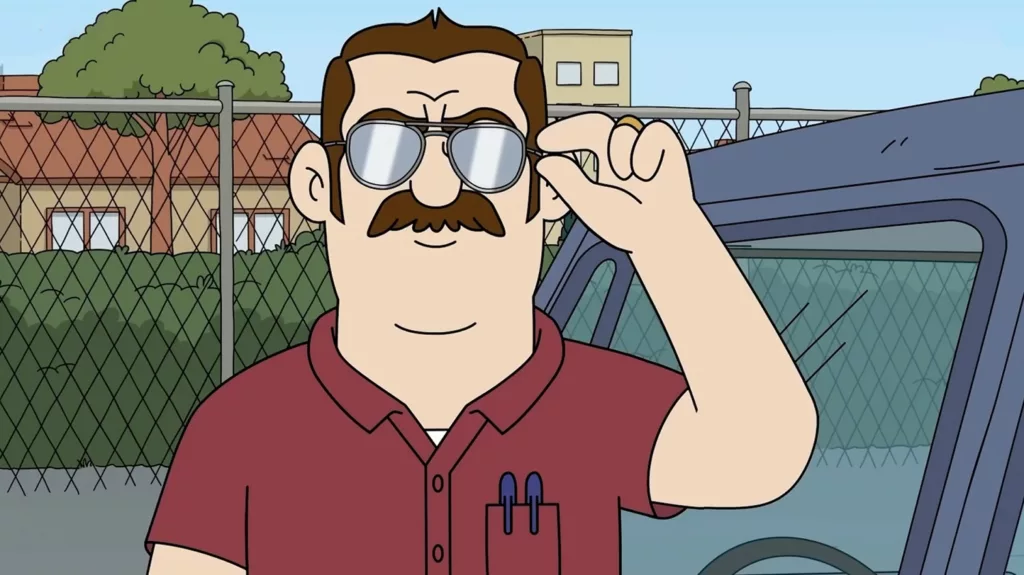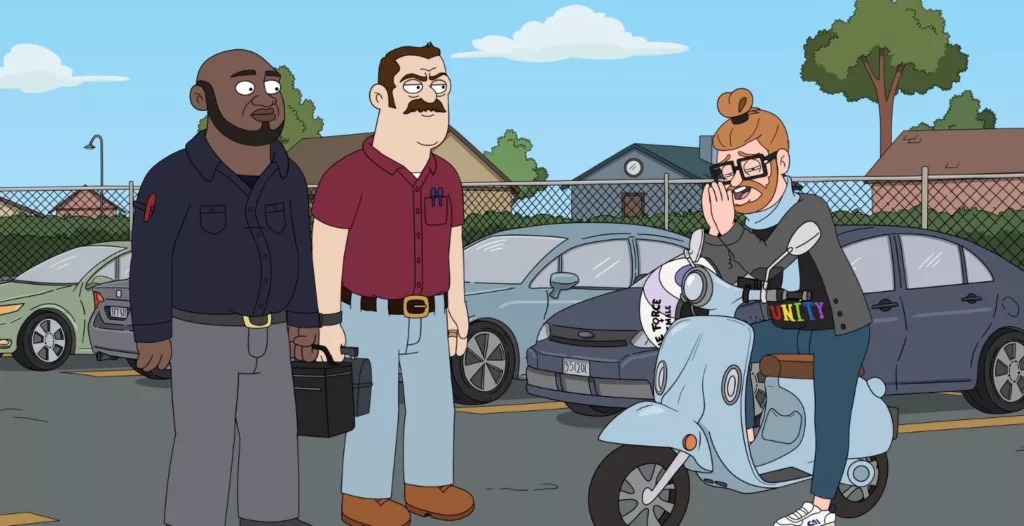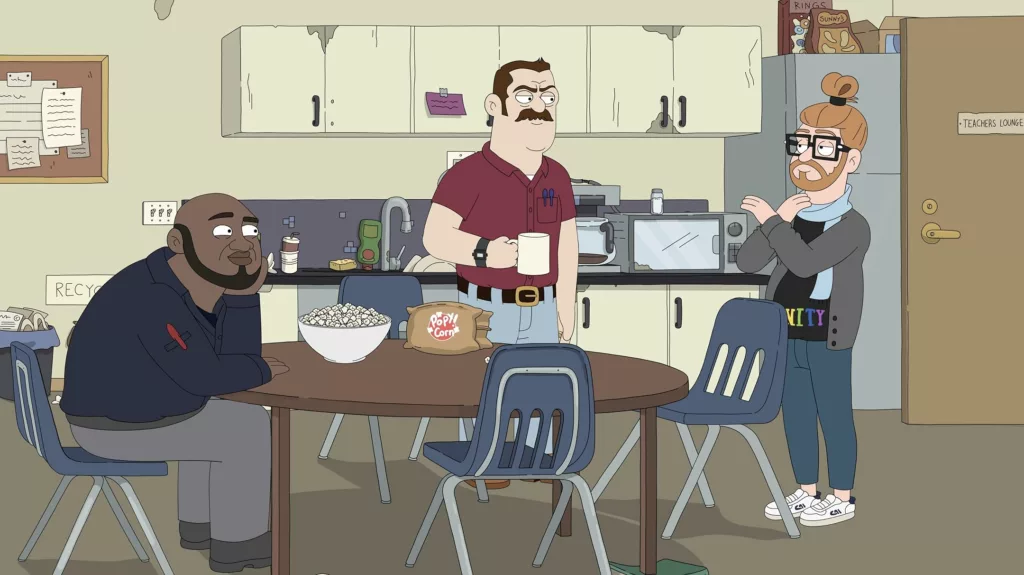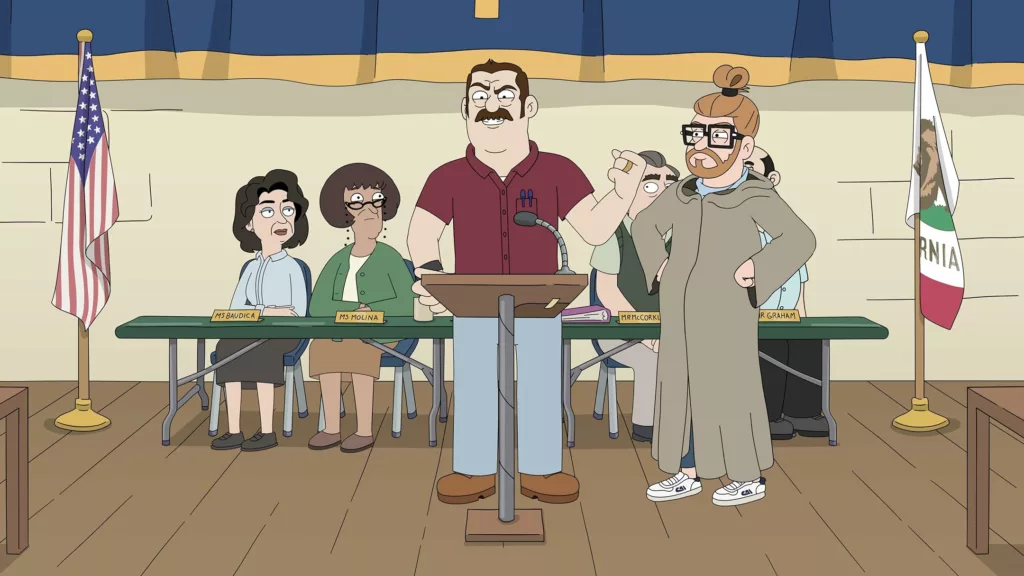Teddy Roosevelt Junior High’s shop class has become the battleground for an age-old conflict. Rule the halls, says Mr. Birchum, a tried and tested teacher of woodworking ways, standing firm in tradition against the creeping tides of time. While students learn the loving craft under his guidance, new challenges have come calling to the classroom.
Enter stage left, Mr. Karponzi of the JEDI brigade. With zeal for “wokeness” and zest for reform, the self-appointed oracle of “equity” eyes Mr. Birchum’s domain with designs for change. None are safe from scrutiny in Karponzi’s school-wide social engineering project, least of all those teachers clinging to old-school methods. Here in the shop class, the clash of conservative craft and progressive fads now plays out in hilarious fashion.
Backing Birchum is entertainment network Daily Wire and its foray into animation. Hoping to offer an alternative to what some see as overly politically correct fare, the production shines a spotlight on woodworking wiseguy Birchum. Week after week, we watch as he defends his pedagogical principles from the encroaching ideologies of inclusivity inspectors. With humor and heart, the show celebrates traditional values while poking fun at modern preoccupations in a way everyone can enjoy, regardless of views. Mr. Birchum, Daily Wire has carved out a character for the ages.
The Visual Style of Mr. Birchum
The characters of Mr. Birchum have a straightforward design that is easy to interpret at a glance. With rounded edges and sensible colors, Birchum and his shop class crew are figures that seem approachable. Their appearances give viewers intuitive cues about who each person is. Birchum himself has a stocky frame and weathered look that indicate his tough fiber. By contrast, the new JEDI officer, Karponzi, stands out with brightly dyed hair and colorful accessories that symbolize his uniqueness.
The animation exhibits a sense of flowing motion that brings these personalities to life. Though minimal in detail, the drawings convey expression and weight. Students push and shove realistically in the crowded hallways between classes. Principal Bortles sighs dramatically when facing the daily dilemmas of her domain.
Small gestures like these help immerse the audience in the high school world. At the same time, a sense of humor is incorporated into the animation. From Karponzi’s dramatically fluttering scarf to Birchum’s wry smiles, levity is found in even simple movements.
Overall, the visuals aim for function over flash. Readability serves as the priority, allowing viewers to focus on the comedic storytelling without visual clutter. As such, the characters act as vessels for their roles in an entertaining cartoon drama. Their designs succeed in making Mr. Birchum’s woodshop a place both relatable and amusing.
Characters Come to Life
Teddy Roosevelt Junior High comes alive through its quirky inhabitants. Leading the pack is Dennis Birchum, the stubborn shop teacher with old-fashioned values. Students call him “Mr. B,” rolling their eyes at his antics yet slipping up with an occasion chuckle at his shenanigans. Voiced with gruff wit by Adam Carolla, Birchum’s rigid facade hides a good-natured soul. Whether bantering with auto shop colleague Don Gage or enduring the latest complaint from his tech-savvy son Eddie, Carolla breathes life into the character.
Don Gage, played comically by comedian Alonzo Bodden, serves as Birchum’s partner in crime. The pair relishes their daily bets and sharing schemes to liven up the school day. Their antics exasperate yet delight students and staff alike. As Birchum’s closest ally and longtime friend, Bodden imbues Gage with a warm spirit that balances out Birchum’s obstinance.
At home, Birchum faces challenges from his free-spirited wife Wendi and son Eddie. In a surprising turn, Megyn Kelly delivers a hilarious performance as the progressive realtor Wendi. Kelly masters Wendi’s snarky rebuttals to Birchum’s traditionalism with perfect timing. As for his son Eddie, Kyle Dunnigan portrays the aimless gamer with deadpan wit. The generational clashes feel genuine, thanks to the actors’ nuanced character work.
In school, Tyler Fischer stands out as the meddlesome social justice warrior, Mr. Karponzi. With flamboyant flare and hyper-woke zeal, Fischer makes Karponzi utterly punchable yet hilarious. Roseanne Barr also shines as the burnt-out Principal Bortles, stealing scenes with her signature brash delivery. The vocal talents bring these eccentric students and staff to vibrant life, driving the comedy through genuine character relationships and conflicts.
Meet Mr. Birchum
Adam Carolla’s new animated series introduces shop teacher Vince Birchum, trying his best to lead in a changing world. From his rows with zealous social justice enforcer Elliot Karponzi to parenting three generations under one roof, Mr. B navigates troubled waters with wit and wisdom. While the show finds its comedy feet, its heart lies in relatable family Humor is hardest when closest to home, as this series explores.
We meet the Birchums amidst our shared cultural clash as traditional ways face fresh challenges. Mr. B respects new paths yet walks his own, convinced that some roads still lead somewhere. His students know a teacher who cares beyond classrooms, and his family, for all its friction, stays together. These ring true as everyday struggles wherever we call home.
The comedy here draws less on flashy trends and more on character. Karponzi offers textbook satire as an easy echo chamber target, yet grows dull beside the Birchums’ nuanced bonds. Their bickering feels as true as any family’s, and Jeanie’s pride in her father, for all they differ, stays sweet. Even the veterans’ rivalry entertains not through crude confrontation but through familiar fondness between old friends.
As episodes unfold, jokes feel less like prepackaged punchlines than pleasures of personal discovery. We laugh less at predetermined sides than with the Birchums when learning from each other, even when opinions clash. Their story, for all its biased bones, sees humor more where humanity hearts us all. If further seasons follow these beginnings with care, Mr. Bmay invites us far more to smile than smirk at our shared state through the delicate art of seeing each other’s.
As Craftsmen Know Best
Mr. Birchum aims to stir conversations that really matter. At its heart lies a familiar desire – to nurture today’s youth and preserve wisdom passed down. Yet rushing risks missing finer points, like the care put into crafting something meaningful.
Episodes feel a work in progress, still finding their flow. Sharing insight deserves its due pace, like sanding affects or letting stain set. Forced is not the same as learned, and learned lessons stick best when bonded over time.
Perhaps patience serves this storytelling well. Let themes develop through character moments rather than forced clashes alone. Mr. Birchum showed glimpses of this – caring for his family pet, mentorship of his daughter. Warmth like theirs strengthens any message more than reactionaries raging.
Promising seeds remain. Future episodes could delve deeper into what moves these souls each day, beyond surface concerns only. By seeing each other’s humanity beyond one issue or another, we find that what unites us is far greater than what divides us. When we listen with care, understanding follows, like water finding its own level.
In rushes, nuance suffers, but nuance renders legacies. This show could be such a legacy if patience guides its way. For a craft is judged not by first cuts but by wonders wrought through iterative learning and love perfected over time.
Our Modern Society
Issues of politics and social dynamics are intricately woven into the fabric of community life. Increasing polarization threatens the nuance required to understand different perspectives. Through the lens of comedy, might we gain insight by focusing less on ideology and more on our shared humanity?
Mr. Birchum depicts a teacher striving to connect with students during uncertain times. Rigid views clash with modern values, yet beneath surface assumptions lie people with hopes, dreams, and complex realities. The show hints at deeper recognition between characters with opposing stances, suggesting dialogue remains possible if we see each other not as stereotypes but as individuals.
Promoting any single reading too assertively risks what the comedy aims to explore—our tendency to divide when understanding could unite. With good faith on all sides, amused reflection may transcend polarization.
The cast shares this vision, their talents elevating even nascent storylines. Issues surrounding politics and society remain challenging, yet isolating blame solves nothing. By maintaining an open mind and heart, we embrace our shared stake in building the just world we all wish to leave our children.
Progress lies not in demonizing “the other” but in appreciating multiple truths. If this comedy can bring a few together through laughter, it serves a higher purpose. Our greatest commonality is also our greatest strength—the human experiences we all know in our lives, our hearts, and our homes—that help us see beyond surface differences to our fundamental kinship. In seeking to understand rather than condemn, may we progress together toward a brighter future.
Mr. Birchum’s Workshop: Crafting Comedy
Within the walls of Teddy Roosevelt Junior High, shop teacher Mr. Birchum is trying to instill his values of hard work and traditional skills. Yet the modern world keeps creeping into his classroom. With change comes challenge, and this show is still learning its comedic footing.
Mr. Birchum’s design and premise have real promise. Here is a character striving to share life lessons, even if his methods may scandalize some. And what teacher has not felt disgruntled with parts of each new school year? The cast brings talent and funny bones too, whether it’s Megyn Kelly’s wit as the scene-stealing wife or Roseanne Barr’s irreverence as the jaded principal.
Still, finding the laughs is a work in progress. Dialogue has a tendency to drag, allowing less room for zingers. Animation moves at a relaxed pace too, sapping energy. Viewers feel like they are waiting around the workshop rather than getting the guided tour.
Jokes also follow familiar blueprints at times. The low-hanging fruit of parodying ideological foes seems like an easy target but yields diminishing returns. Like any beginner jokesmith, this show must hone its unique voice and style.
Yet like the projects Mr. Birchum sets for his students, with refinement can come great things. Subsequent episodes display more character-driven scenes away from “wokeness” bashing. Given time in the workshop, there is potential to craft solid gags from life’s relatable absurdities over any simplistic sides taken.
With audience feedback and studio support, perhaps new installments can tighten pacing and discover fresh angles. Mr. Birchum and crew still have much to learn but show signs of becoming comedy artisans. With patience and practice, their humor may finish as strong as the furniture they forge.
Refining Focus
From its politically-tinged premise to its uneven animated debut, Mr. Birchum has spurred thoughtful debate around edgy comedy and an entertainer’s prerogative. Yet beneath surface assumptions, a kernel of potential gleams.
Chief amongst early difficulties, scripts lean formulaic where refreshment’s required. Predictability plagues punchlines that aim to surprise. Yet caricatures bring levity, and spotlit struggles feel familiar. With polish, Birchum’s world could resonate rather than ruffle alone.
Progress demands patience and an open hand. Creators now grasp both fan fervor and faults to fix. With input incorporated, each episode may evolve in exploring issues from a view less traveled. Nuance often emerges when brave souls breach barriers, finding common ground between polarized shores.
Still in its infancy, this venture could mature into something memorable. But birthplaces must let works wander and find their footing before judgment lays them to rest. With a renewed focus on craft instead of cause, Mr. Birchum shows signs of enriching dialogue, bringing levity and light where once it was heat alone. In its willingness to evolve lies a project’s promise, and every work deserves a chance to find its voice.
Potential remains if listeners substitute lectures and discussions guide, not dictate. With care and humor joined, this show may yet surprise in revealing our shared humanity.
The Review
Mr. Birchum
While Mr. Birchum displays flashes of fun, its debut struggles under the weight of expectation. Conceptually clever but casually executed, the series seems in search of balance between punchlines and messages. Yet with time, polishing promises progression. Potential exists if given room to find its comedic voice beyond easy targets. As scripts sharpen and the cast settles, this show could yet surprise by facing modern divides with empathy, disarming division through laughter alone. But patience will prove necessary as creators process criticism and hone their craft. Here's hoping continued efforts earn this entertaining enterprise a chance to connect its dots into smart, nuanced satire for ages to come.
PROS
- Engaging concept and premise
- Strong comedic cast with proven talent
- Raises thought-provoking issues in a thoughtful way.
- Flashes of funny, relatable humor
- Potential to stimulate meaningful debate
CONS
- Unbalanced focus on political messages over comedy
- Predictable, formulaic scripts and jokes
- Slow, stilted delivery hinders humor.
- Uneven animation quality
- Struggles to find a unique comedic voice
